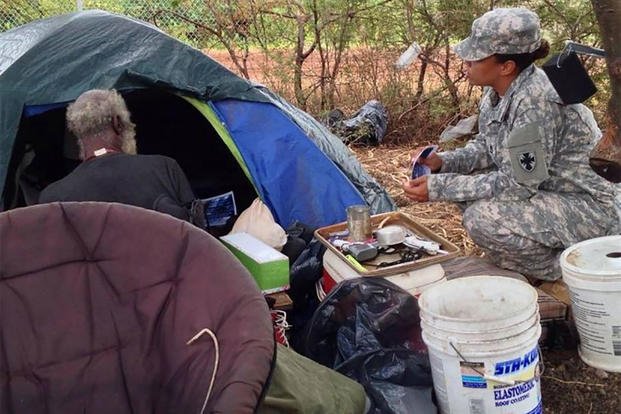I spotted him from across a busy intersection near the White House. Surrounded by bags and backpacks, he held a creased cardboard rectangle with the words “Iraq Combat VET” scrawled in Sharpie. He was homeless veteran begging for money.
It never occurred to me not to stop and talk to him. I pictured him easily as one of the sailors in my husband’s squadron, roaming the hangar in coveralls and reeking of jet fuel.
Even though I haven’t been a “CO wife” for years, that get-‘er-done instinct kicked in. I was confident that with a few phone calls, I could help connect him with the right resources.
Sign of the Times
I towered above him as he sat cross-legged on the cement. Once I crouched down so we could be at eye level, his wary expression softened.
I told him about a place that helps vets get health care, but he said he was already covered. “What I need is a job,” he said forcefully. He showed me one of the books splayed spine-up next to him, a paperback of essays by Iraq vets, and mentioned that he’s a writer. Four other books by veterans peeked out of his backpack and rested on top of the bags beside him.
Strange that he’d be reading so many books on the same topic at one time, but I reasoned that since he was homeless, all of his belongings traveled with him.
“You see a vet, you give him my number.”
I texted a friend -- the Executive Director of Code of Support and a former Army wife. A few years ago I signed on to the organization’s Code, which asks for a commitment to share the responsibility for service members in need. One of the five pledges is “As they have sworn to defend me and protect our country, so will I pledge to support them in every way that I can, and to avoid any action that would increase their risk.”
I knew this alluded to sending troops into battle without the necessary resources to protect them, but the sight of a vet begging on a street corner seemed qualify as standing in harm’s way.
“You see a vet, you give him my number,” she texted back. Her reflexive generosity made me feel bad that I’d walked away without even asking his name.
Could this be fake?
The next week he was at the same street corner, surrounded by the same paperbacks. Props, I thought.
Then felt ashamed at my own cynicism. I crouched down to talk and got his email address, his name, and a fast-forwarded version of what landed him on the street, though there was still no mention his military stint.
I gave him $4, which emptied out my wallet, and invited him to a literary conference beginning that very evening on “writing the war experience.” Something flashed in his eyes (gratitude, I assumed), but he told me he couldn’t make it.
Secretly, I was relieved. I wanted to be like my friend who responded, “You see a vet, you give him my number. “ But it was going to be hard to explain to my husband why I was showing up with a stranger who smelled like wet socks, vet or not.
Over dinner that night, I told the story to my husband and a friend, who listened with identical polite half-smiles.
Then they were gentle. Together, they pointed out how the details of the guy’s story didn’t add up. Due to the Stolen Valor Act (struck down by the Supreme Court in 2012) people are aware that others do fake military service. Still, the chance that he could be a vet – albeit a vet with an unusual story – spurred my sense of urgency.
The unwritten contract between civilians and veterans.
It is immoral to walk past a former service member who’s hungry or homeless, a turnaround that runs counter to the unwritten contract between civilians and those who pledge to protect them.
Still. Something about those paperbacks planted a seed of doubt even before our dinner. Once I got home, I plugged the guy’s name into Google, which turned up links to protests he led on behalf of the anarchist movement, rambling articles opposing “the hierarchy,” and accounts of his ongoing activism against various federal policies. I found his LinkedIn profile. More of the same. And no military service.
But that flash in his eyes when I invited him to the veterans’ writing conference had felt like an acknowledgement of kinship. Had over a decade of living in the bubble of the military community, where people look out for each other no-questions-asked, knocked my internal compass out of whack? It spun unhinged, arms akimbo, which was exactly how I felt.
Fake homeless veterans shake the civilian/service member bond.
I’ve spoken up since the start of the Iraq war on why the military and civilian communities must understand each other better, and how the gulf between the two reinforces the idea that military service in America is for “someone else.”
Over the course of the wars in Iraq and Afghanistan, I’ve watched that gulf shrink as more civilians have been directly affected by the conflict, either because they knew someone serving or because they’d made the effort to understand war’s impact on the military and military families. Service members also seem less dismissive of civilians – more willing to admit that Americans can do their part in different ways. Each side was moving toward a more intimate understanding of the other.
But a self-identified anarchist who passes himself off as a vet perverts that long sought-after intimacy – and that’s what shook me.
Weeks later, after Veterans Day has come and gone, I still see the fake vet across the street from the Metro, surrounded by paperbacks, holding his sign.
I’m angrier each time, but mostly at myself. It’s a tremendous effort not to feel duped, embarrassed by my eagerness to help one of our own. He and I stare past each other as I cross the intersection, and I remind myself of what, deep down, I knew all along: that for vets, signs of distress will never be as obvious as words scrawled on a creased piece of cardboard.
Alison Buckholtz is author of Standing By: The Making of an American Military Family in a Time of War and a contributor to Stories Around the Table: Laughter Wisdom and Strength in Military Life. Her articles and essays have been published in the New York Times, New York Magazine, Slate.com, Real Simple, Parenting, Washingtonian Magazine, Salon.com and many other publications.









